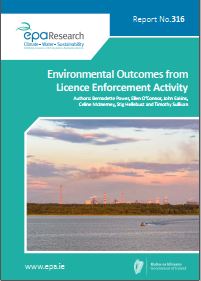Authors: Bernadette Power, Ellen O’ Connor, John Eakins, Celine McInerney, Stig Hellebust and Timothy Sullivan
Summary: The ultimate objective of environmental regulation is the prevention and reduction of environmental harm from pollution, habitat loss and resource depletion. The findings from this research provide an update of current practices and recent changes introduced in some jurisdictions.

This desk study reviewed the development of environmental performance measures for the promotion of compliance and the measurement of the impact of and outcomes from enforcement activity. The research also reviewed types of metrics of environmental outcomes available in Ireland and gaps in these metrics. The review examined new approaches that are more collaborative, as well as trends in environmental enforcement activities, coupled with recent developments in the environmental enforcement methods of enforcement agencies in Scotland, England and Wales, and Canada.
Ireland needs to make greater strides in achieving national environmental targets and meeting the international obligations it has committed to under the European Union National Emission Ceilings Directive and the Water Framework Directive, etc. To build a culture of compliance and to deliver a healthy and well protected environment, regulatory and enforcement agencies need to continue to work with industrial, water and waste sectors to deliver improved environmental performance. Environmental performance at the national level has been recorded in recent years based on national inventories and monitoring activities, but it is difficult to link national environmental outcomes directly to enforcement activity. The findings from this review suggest that national figures may also mask sector and regional issues that can have severe impacts on the health and wellbeing of individual communities and the quality of the local environment.
Environmental regulation agencies have limited budgets and strive to deploy resources strategically. Internationally, there has been a move towards using a more collaborative approach (e.g. sector plans, green badges) in environmental regulation, which may appeal to different motivations and push companies to go beyond compliance and embrace more sustainable practices. While popular in some countries, the evidence of the efficacy of this approach is scarce. The findings from this research recommend continuing to use traditional enforcement measures in conjunction with further collaborative measures until there is further evidence supporting the latter.
The EPA has set out a number of key environmental actions and priorities for Ireland, including the need to “integrate resource efficiency and environmental sustainability ideas and performance accounting across all economic sectors”. Sectoral plans represent a global trend in environmental licensing and enforcement to promote shared problem-solving and efficiency, to drive both compliance and environmental performance. This research reviewed the frameworks and methods used to develop broad integrated sector-specific environmental performance indicators for different industry and manufacturing sectors and indicates how these can be applied in Ireland. An assessment of performance indicators for Ireland pointed to an overreliance on emission outputs and gaps in the following areas: natural capital including biodiversity; resource efficiency; and decoupling environmental harm from economic activity, including the low-carbon economy, supply chain impacts and people’s health and quality of life. This review of empirical literature on the effectiveness of different types of non-traditional environmental enforcement activity, such as awards and third-party accreditation schemes, shows that strong traditional sanction-based enforcement is critical to environmental protection work. The review suggests that there is some evidence to support the use of co-operative activity in conjunction with strong regulatory pressure. More evidence is required on the effectiveness of co-operative activity to determine a good balance between traditional enforcement and compliance assurance. Notwithstanding this, encouraging a co-operative attitude from business is valuable, as it moves licensees further into the realm of holistically monitoring their environmental performance. This review provides suggestions for future research and recommends the development of (1) targeted sectoral plans to address key priority problems; (2) sectoral environmental indicators to monitor environmental performance at a sectoral
level; and (3) a system of digital badges to communicate the environmental performance of licensed facilities and reward good behaviour.